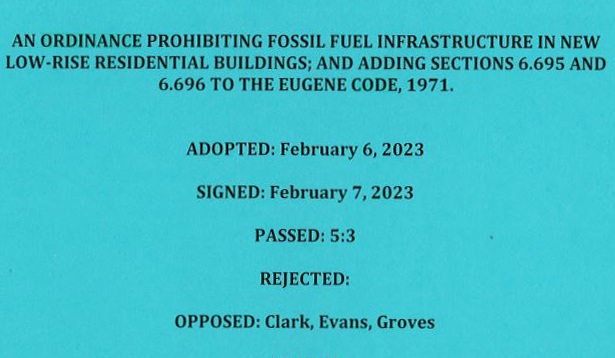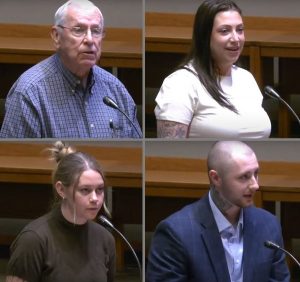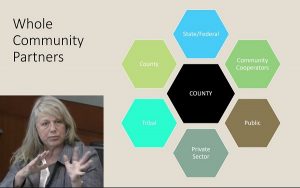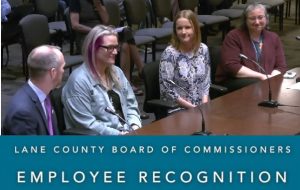After repealing fossil fuel ordinance, council looks for input, funding, results
7 min read
After opponents forced a referendum in November, Eugene’s City Council repealed an ordinance passed earlier this year. On July 10:
Councilor Emily Semple: It pains me to do this, but since I’m the one who brought forth the original motion, I feel it needs to be me who makes it… I move to repeal Ordinance 20681 entitled, ‘An ordinance prohibiting fossil fuel infrastructure in new low-rise residential buildings and adding Sections 6.695 and 6.696 to the Eugene Code, 1971.’
[00:00:41] Mayor Lucy Vinis: All in favor of the motion, please raise your hands. 1, 2, 3, 4, 5, 6, 7, 8. That passes unanimously.
[00:00:49] John Q: Leading up to the vote, city councilors shared their thoughts about the repeal.
[00:00:55] Councilor Jennifer Yeh: It doesn’t feel good to be withdrawing this electrification ordinance and I know there’s a lot of people in our community who share that sentiment. But considering the recent Ninth Court decision, I think it’s the right thing to do at this time.
[00:01:07] I want to make it clear that improving the health and safety of our community is of the utmost importance to me and many of my colleagues, and that phasing out fossil fuels is a very important part of that effort. The Ninth Court got it wrong, and I’m very thankful that there is an appeal going through, and we will be following that process very closely here.
[00:01:26] And I look forward to what we can do in the meantime to make progress. There’s lots of other things that we can do but that doesn’t mean that this is the end of this road as well.
[00:01:37] Councilor Alan Zelenka: Yeah, we absolutely do need to stop burning fossil fuels and we need to decarbonize. There are four pillars to decarbonization: (1) energy efficiency, (2) cleaning up the electric grid, (3) electrifying end uses and (4) developing low-carbon fuel for those end uses that can’t get electrified. So, I think at this point it’s appropriate to repeal this.
[00:01:56] We’re going to be caught up in the courts for potentially years. It’s disallowed staff from working on climate work because of the ballot measure… We still haven’t had a single metric ton or even a pound of greenhouse gas emissions reduced because of this tactic. So I think it’s time to move on and focus on things that actually reduce greenhouse gas emissions. This tactic has not worked. It’s not going to work.
[00:02:18] It’s also insignificantly small. New construction in the residential in future, in new construction: Emissions is 0.4% of the greenhouse gas emissions we need to reduce over the next 20 years. So, if we’re actually trying to reduce greenhouse gas emissions, this is not the place to focus. The existing system, existing use of greenhouse gases in our buildings in our transportation system. Emissions are where we should focus.
[00:02:46] My intent is to align what we’re doing with the significant stuff that’s happening at the state and the federal level, because there’s lots and lots going on. There are numerous programs, numerous regulations and there are literally billions of dollars that we can access.
[00:03:02] I wrote a four-page memo to folks, that listed all of the different programs and regulations that are already in existence that we can tap into or be in alignment with, including a lot of things on the transportation sector.
[00:03:18] And then just finally, one more point when we asked the Good Company to come back to us, one of the things that they said was ‘Be strategic.’ And they had many sound recommendations. Specifically, they suggested focusing on existing buildings. That’s almost all the greenhouse gas emissions from the building sector. And that’s the intent here, is to really focus in on stuff that actually can make a big difference.
[00:03:43] Councilor Greg Evans: There are other ways that we can get to where we want to go and we need to move in that direction. I’m looking forward to having a conversation about how we incentivize change in our community, how we encourage residents, businesses, and other entities in our community to move towards a fossil-fuel-free environment. But we have to do it in a way that is going to bring along possibly not everyone, but the majority of our community in a collective effort to make this change.
[00:04:20] I think that we can do some things on the local level to forgive some fees, or to suspend some fees, or do some other things, eliminating fees, that may further encourage decarbonization and different ways and different modes. We have solar, we have wind, and now there’s emerging technologies of wave technologies from the ocean that are now coming into play.
[00:04:50] Councilor Randy Groves: And I also concur with Councilor Evans in looking at what we can do to incent change as opposed to a heavy-handed ban. And that’s been my problem from day one with this is that if we’re going to go that route on something like this, it should be a vote of the people.
[00:05:07] My sense is this is not a way to usurp the referendum petition process, but I would be very distressed if it were. I think that in good faith we need to repeal this but at the same time there’s other things we can do.
[00:05:24] Councilor Mike Clark: Mayor, I appreciated your voice on this, talking about other ways that were not bans and so heavy-handed, and I’m willing to have those discussions. I’d love to have them. But I’m not willing for us to go down this same road again later…
[00:05:37] When Greg first brought up the idea of incentives, I was entirely for it. And Randy has mentioned this and spoken to it many times, and I was in favor of that discussion. But when the council turned to a more heavy-handed approach, I think that was a mistake, always have…
[00:05:54] It is extremely heavy-handed, and the way you know the community agrees that that’s the fact is how quickly they got the signatures to repeal it, and it’s the very reason we’re taking it off the table right now. We know it’ll fail in November and so it’s a save-face attempt.
[00:06:14] Councilor Matt Keating: I just, I keep hearing the words ‘heavy-handed’ batted around to describe an action that council appropriately took and banning fossil fuel hookups in new low-rise residential homes that don’t yet exist, from my vantage point is far from heavy-handed.
[00:06:34] But it’s imperative that (A) the conversation come back, (B) that we talk incentives, and (C) that Eugene continues to lead in developing and passing new legally-defensible ordinance language that requires fossil fuel residential construction to be all-electric, as soon as possible.
[00:06:54] I also want to make it really clear that the pro-fossil fuel propaganda campaign that had been launched targeting children, litigating against statewide policy, and spending more than $1 million, largely with a misinformation campaign—
[00:07:13] It’s clear to me that the fossil fuel industry, NW Natural in particular, will stop at nothing to keep polluting with fossil fuels. So I come at this from a vantage point wherein it’s clear to me as elected officials: We have a responsibility to protect our residents from the worst impacts of the climate crisis and to continue to lead in a transition to clean, renewable electricity.
[00:07:43] We must show the fossil fuel industry that we will not be cowed out of taking necessary steps to build a more sustainable, equitable, fossil-free future.
[00:07:55] Councilor Lyndsie Leech: Yeah, not super happy about this vote, but I am happy to continue this conversation and recommit ourselves to doing real substantial climate work in our community. I think it’s time that we reanalyze, restrategize, and work really closely with our whole community to be able to engage work with our business community, be able to come up with some innovative solutions together.
[00:08:21] John Q: Staff will schedule a new work session as soon as possible after council returns in the fall.
[00:08:29] Public Works Director Matt Rodrigues: Ian (Penn) and his team have already been doing a lot of work trying to understand the federal and state funding packages that are coming through and preparing when the opportunity presents itself, to start that community outreach in the near term where we could integrate this in.
[00:08:44] So I don’t think we are likely to have all the answers in the fall because some of the federal rules are still in process and where the money flows, whether it’s the state or locals, is all still developing as a picture. But I think we’ll be able to give you some significant information for you to consider about where things are.
[00:09:02] John Q: Councilor Alan Zelenka says despite a large investment in staff time, the council action did nothing to reduce greenhouse gas emissions. He urged the city to align with funded programs that produce actual results.



